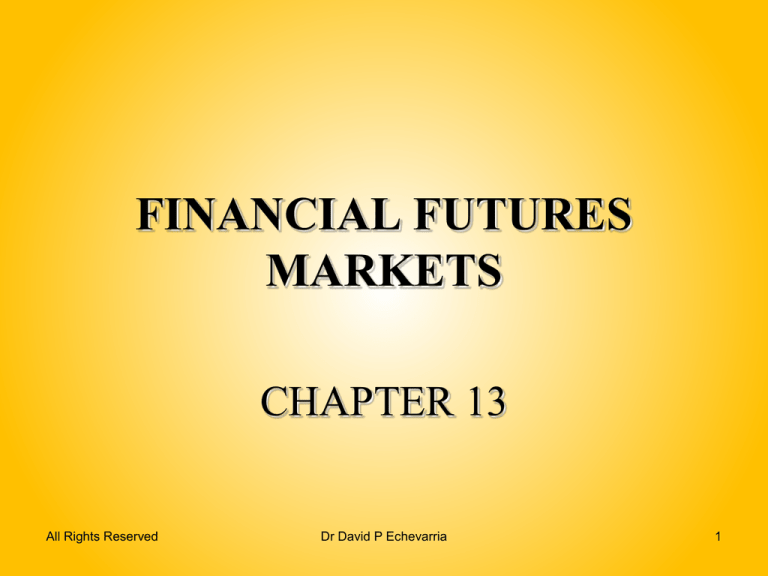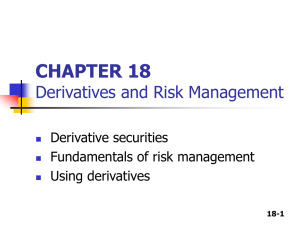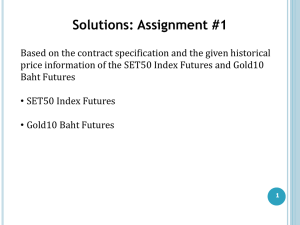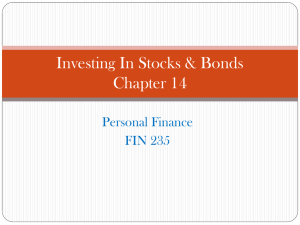
FINANCIAL FUTURES
MARKETS
CHAPTER 13
All Rights Reserved
Dr David P Echevarria
1
Derivative Securities
A. What are Derivative Securities?
1. High leverage securities that can be used to;
Speculate
or
Hedge
2. How do we speculate?
a. Suppose we believe that the weather will reduce this
year’s wheat harvest. A poor harvest will result in
higher prices. We can open a long futures October
contract for wheat. If as the year progresses, the
weather cooperates – the price will go up > profit!
All Rights Reserved
Dr David P Echevarria
2
Derivative Securities
3. How do we hedge?
a. A hedge is a form of insurance.
b. Suppose we are a jeweler and we use a lot of gold to
make custom pieces. If the price of gold rises, so will
our costs. To hedge against a rise in prices we open a
long gold hedge. If prices rise – we will profit from
the long hedge and offset the increased cost of buying
new supplies of gold.
c. If we are a seller of gold – our fear is that prices will
drop. We will open a short futures hedge. If prices
drop, we will profit on the short position.
All Rights Reserved
Dr David P Echevarria
3
VALUATION OF FINANCIAL
FUTURES
A. Market Value of Futures Contracts
1. Value is dependent on the value of the underlying
security
2. Derivative Securities may also be called contingent
claims
Primary economic function = HEDGING MARKET RISK
3. Interest Rate Futures used to hedge against adverse
changes in interest rates
4. The hedger is protecting a long or short position in the
market
5. The speculator expect to profit if rates in the expected
direction (up or down)
All Rights Reserved
Dr David P Echevarria
4
VALUATION OF FINANCIAL
FUTURES
B. Forward Contracts; (Not publicly traded)
1. Agreement to buy/sell at a future time
2. The LONG position: party agreeing to buy the
asset
3. The SHORT position: party agreeing to deliver
(sell) asset
4. Delivery Price: price specified in the forward
contract
5. Settlement on a Forward contract occurs at
maturity
All Rights Reserved
Dr David P Echevarria
5
VALUATION OF FINANCIAL
FUTURES
C. Futures Contracts: (publicly traded)
1. Contracts are standardized
2. Delivery date: by month and the exchange on
which contract is traded sets the delivery date
3. For commodities, may be anytime during the
expiration month
4. Daily Settlement or Marking-to-Market on price
changes
All Rights Reserved
Dr David P Echevarria
6
VALUATION OF FINANCIAL
FUTURES
D. Arbitrage and the Law of One Price:
1. Two identical goods cannot sell for two different
prices
2. When prices are not in sync, arbitrage
opportunity
E. Risk Management:
1. Hedging against adverse future price movements
(market risk)
2. Price discovery; expectations of future price
levels
All Rights Reserved
Dr David P Echevarria
7
FUNDAMENTALS OF FUTURES
MARKETS
A. Forward Markets
1. Deferred delivery (expected price at time T)
2. Utilizing the storability factor
3. Hedging future price movements resulting from changes
in Supply and Demand
4. Forward vs. Futures Contracts
5. Price discovery
B. Spot (Cash) Market:
1. Immediate delivery (today's market price for commodity)
2. Hedge point; we are generally hedging a spot position
All Rights Reserved
Dr David P Echevarria
8
FUNDAMENTALS OF FUTURES
MARKETS
C. Defining Profits in Spot and Futures Contracts
1. Basis (b): Spot - Futures Price
Later: Increasing basis favors Long hedger/speculator, decreasing
basis the short
Profit = - b (if held to T) P = -b + b (if offset prior to T)
D. Daily Price Movements
1. Each commodity has a maximum daily price change
2. Trading stops when a limit is reached
3. May reopen on authority of Exchange Floor Manager to
maintain orderly market
All Rights Reserved
Dr David P Echevarria
9
FUNDAMENTALS OF FUTURES
MARKETS
E. Opening a Futures Position (assuming you
meet financial qualifications)
1. Determining Expectation
Long: expect prices to go up
Short: expect prices to go down
2. Depositing initial margin
3. Closing position before first day of expiration
month (to avoid assignment)
All Rights Reserved
Dr David P Echevarria
10
TYPES OF HEDGES
A.
B.
C.
D.
E.
Interest Rate Futures
Commodity futures
Currency Futures
Stock Index Futures
Single Stock Futures
All Rights Reserved
Dr David P Echevarria
11
HOMEWORK QUESTIONS
A. What is a forward contract? How does it
differ from a futures contract?
B. What is arbitrage? How does the law of one
price relate to arbitrage opportunities?
C. What is the difference between hedging and
speculating?
D. How does the long position profit? The short
position?
E. How are stock index futures settled?
All Rights Reserved
Dr David P Echevarria
12







